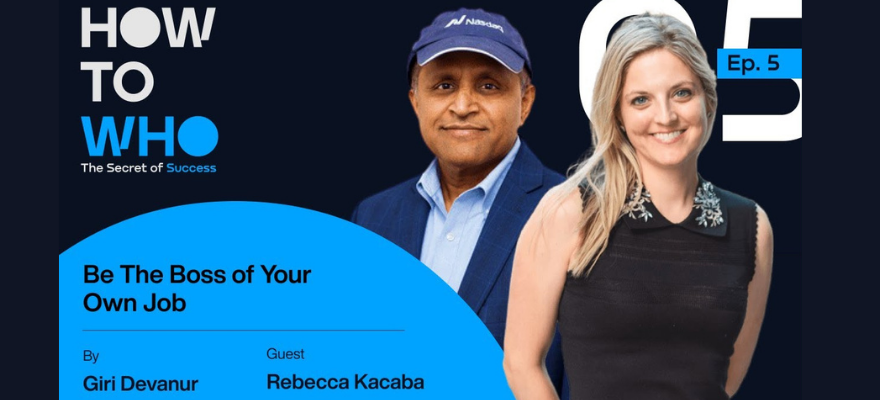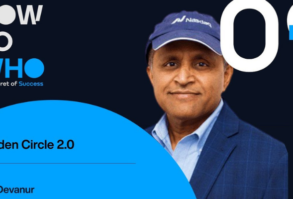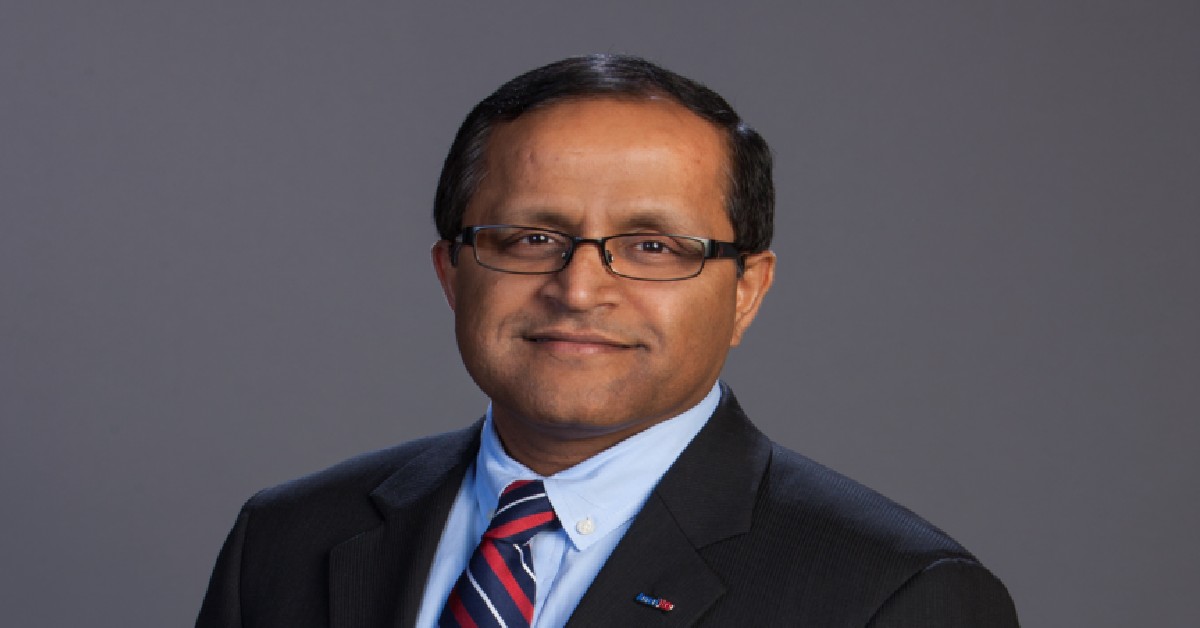Holland Walker (00:01 – 00:33 )
Hello, everyone. Welcome back to How to do the Secret of Success. Today, Giri and I are joined by Rebecca Kacaba, who is the CEO and co-founder of Deal Maker. And she was actually named one of North America’s most innovative lawyers by the Financial Times. And Giri and I wanted to talk to her because she’s had this incredible journey from lawyer to fintech entrepreneur, which just sounds really interesting. So, Rebecca, why don’t you go ahead and tell us about your background and a little bit about you?
Rebecca Kacaba (0:34 – 1:20)
Sure thing. Thanks, Holland. And thanks, Giri, for having me. I started my career on Bay Street as a capital markets attorney, taking companies public, mergers and acquisitions and helping companies raise capital. Along the way, I started a program specifically for startups, early stage companies, and they do a lot of private placements.
And one of the pain points that I saw was that process was really messy. And it just breaks your heart to watch entrepreneurs go out there raise money. I know how difficult that can be. And then to get all tied up in process. So that’s what led my co-founder and I to want to have a better technology-based approach and what led us to want to start Deal Maker, what I call Shopify for the capital markets.
We want to make it as easy to sell shares online as it is to sell shoes.
Giri Devanur (1:30 – 1:49)
All right!
Since, you know, you have worked on a lot of M&A mergers and acquisitions and, you know, a lot of deals, I have a fun question for you to begin and then we’ll get into serious questions.
Do you think, you know, like the U.S. and Canada should merge? There is so much common between the countries.
Rebecca Kacaba (2:43 – 2:55)
Well, that’s a loaded question, I think, because so much of my business is in the U.S. You know, I spend so much time, more time with Americans than Canadians these days. You know, and I didn’t used to. But given the current situation with the truckers and the amendments of our Emergency Measures Act, you know, I would have said no.
But now today you caught me on a day where, I don’t know, maybe you guys could get some of those under control. But I think, you know, Canada has some unique aspects to its culture that would be lost or subsumed by a merger with the U.S. And that’s one of the key factors you’ve got to look at in a merger, right? Does culture clash or could the two work together?
Holland Walker (2:34 – 2:41)
Yeah. What do you think one of the biggest cultural differences is between Canada and the US? Just because I’ve only been there once. I’m just curious.
Rebecca Kacaba (2:43 – 2:55)
Well, I know what we’ve found is Americans have a much better risk appetite. They’re much swifter to adopt technology and just more aggressive in the style and the way they approach business.
Giri Devanur (2:55 – 3:03)
And, you know, Holland. Let me add one more thing. Canadians are much nicer, even though I’m an American.
Rebecca Kacaba (3:04 – 3:20)
It’s true. It’s true. I remember the first times I would get on some of those merger negotiations because a lot of the mergers I did are cross-border, right. That’s just the nature of the Canadian economy and the way the American lawyers negotiated it compared to the U.S. lawyers. Totally different style.
Giri Devanur (3:20 – 3:29)
I have been on the other side and being on the American side, you know, negotiating with some Canadian lawyers they’re really nice.
Rebecca Kacaba (3:30 – 3:32)
So, yeah, yeah, yeah. It’s a totally different style.
Holland Walker (3:34 – 3:43)
So speaking of aggressiveness in business, I think the first name that comes to mind is Elon Musk for me. If you had to make a deal with Elon Musk through deal maker, what do you think it would be?
Rebecca Kacaba (3:44 – 4:10)
I would totally make a deal with Elon Musk. And the thing that I would love to do is pay him to promote and tweet about dealmaker, because that is what would take my business to the next level. So I would negotiate a three part series over 18 months because we got to handle that volume that comes from one of those tweets. But that would be the next level. Elon talking about retail, capital raising, that would blow our sector up.
Giri Devanur (4:11 – 4:48)
Like you have been seeing that, you know, he has been, you know, like promoting a Dogecoin and, you know, all kinds of why not dealmaker maybe, he always puts to the moon kind of emojis. You know, like yesterday, you know, he made a very powerful statement that in the next five years, he thinks that, you know, like, we will be landing on Mars and things like that.
So if Elon, you know, like, let’s say this goes viral and, you know, like he hears about you and then, you know, he offers you to go to Mars. Would you go to Mars?
Rebecca Kacaba (4:49 – 5:08)
I would love to go to Mars. What I would do, I do not want to go to Mars on the beta because, Giri, you and I both released bata. So I would like to buy a ticket for 20 years from now when my kids are grown up and we know the technology is there.
Giri Devanur (5:09 – 5:11)
That’s a good answer. That they’re very good answer.
Holland Walker (5:11 – 5:23)
All right, Rebecca, so if you were appointed chairwoman of the SEC, would you make it mandatory to trade all stocks in Bitcoin or some other crypto?
Rebecca Kacaba (5:23 – 6:09)
Oh, well, that’s an interesting question. And I think, you know, coming from Canada, the U.S. Fiat has a really good infrastructure that Americans take for granted. There’s a lot of value there already. And I think, you know, with Reg A+ the SEC is doing a great job. So maybe I would push the conversation forward on what digital assets constitute as security. I think that could lead some to some great and interesting conversations and economic activity. We did a great webinar with Congressman Warren Davidson a couple of months back on the topic.
And I think I agree with him that a lot of education and innovation still could be done with Congress and with a bunch of levels of governments That would be my focus.
Giri Devanur (6:10 – 6:31)
Very interesting twist to that, right. So you are building a fintech platform, which is growing rapidly. I know how fast you guys are growing. A lot of good stuff happening in Dealmaker. While building this business, What are the kind of challenges that you are facing in your day to day work?
Rebecca Kacaba (6:32 – 7:05 )
I think we’re blessed to be faced with the challenges that a lot of rapidly scaling companies face. You know, like reAlpha. You want to scale at a really rapid pace. You have a great opportunity in front of you but building out your own internal infrastructure to keep up with that rapid scaling is a challenge. And you implement a system and then a year later, you’re too big for that system and you have to move on to a new system.
And hiring has always been a challenge for us to hire as fast as we want to. So there was a great challenge as to how, you know, those are the challenges.
Holland Walker (7:05 – 7:12)
What do you think the top five trends are that are happening in the crowdfunding space?
Rebecca Kacaba (7:13 – 8:37 )
Yeah, a lot of the things that we are seeing are the impact that the technology is having on the amount of capital raised.
So as the process becomes smoother and more streamlined and more powered by data analytics, we’re seeing that have an impact on the amount of capital raised. We’re seeing more internationalization of the SECTOR with more countries getting involved. And as we grow our technology, we’re focused on creating a global source of capital. So breaking down those national barriers into one global pool of capital that companies can access, you know, some of the other things we’re seeing is just a different type of company trying it.
We’ve had companies what used to be very consumer facing products in the early days. We’ve now seen companies from all different sector, carbon credits sector, the potash sector, robotics sectors doing successful reg As. So different types of companies raising some changes have been the way that companies are using the analytics. For example, we had one company regularly increasing the price of their offering on a new cadence.
So really digging into reg A and what raising for a year means and setting new standards for the way these kind of raises can be done.
Giri Devanur (8:38 – 9:18)
Great challenges, right you know, like great opportunities as well. So, you know, the theme of this podcast is how to who. Because, you know, like an opportunity or a challenge is thrown at entrepreneurs, right? All of us, you, me and many other entrepreneurs we all know, the first conclusion is how do I handle this or how do I solve this challenge?
Right. How do we switch, you know, from that, to hiring great people and what are they not like aspects that you are seeing as a group leader? How do you hire those kinds of great people? That’s a challenge for all our audience that, you know, we’re building companies.
Rebecca Kacaba (9:19 – 10:23)
Yeah, definitely. And we have done both, right. We’ve hired people with deep experience in the job we were hiring for or we’ve hired people with no experience or little experience, but they’re a quick thinker. And I think my bet is always on a confident quick thinker. If people are confident, they’re able to say their opinion and confidently take feedback that allows them to get better.
You know, people that don’t have ego, they have great listening skills and a desire to lift up other people around them. To me, that creates a great culture where we have rapid innovation of ideas and people taking control. I always say everyone’s the boss of their own job. Regardless of what job you do in the company, you’re the boss of that job.
You know how to do it better than everyone else in the company. So it’s your job to automate that job, automate yourself out of that job and move on to the next job. So regardless of what you do in the company, that’s your focus and that’s your drive. And that’s how we create a culture of innovators.
Holland Walker (10:24 – 10:52)
Yeah, that’s really cool to hear you talk about kind of having a quick being a quick thinker, even if you don’t have exactly the experience that you might have been looking for.
Sometimes you can just see the potential in people and see that they have the willingness to learn and that they can really pick it up if they are dedicated to it. So if deal maker became, you know, like the next big thing the next Goldman Sachs, who would be the next hire? You know, what would you guys be looking for in that candidate?
Rebecca Kacaba (10:53 – 11:39)
Yeah, that’s a challenging one, right? Because I think the challenge is to transition. You know, we’re at 65 people right now and as we grow over the next couple months and then will crest over 100 we’re going to transition from self-starters to being a larger environment where we do need those processes. And as an entrepreneur, you know, by my very core of being rebel is against those processes, but you need them so that you can scale.
So how do you look for people who are self-starters but they can still operate in an environment that large and be happy doing it and innovative and doing it well? It’s a work in progress, but I think we can get there if we keep the culture tight.
Giri Devanur (11:39 – 12:30)
I do hope that, you know, like you build the next Goldman Sachs or Blackstone kind of company, see your building a nontraditional fintech right? you’re building, you know, commercialization and, you know, globalization. In reAlpha, we are seeing that in on your platform, we have investors coming in from 68 countries, by the way, including Mongolia.
Right. I keep joking about it that, you know, like we have an investor from Mongolia. Right. So building a fintech is all about tech. Marc Andreessen of Andreessen Horowitz, he had made a very powerful statement a few years back that one good programmer is equal to the 30 average programmers. Hiring tech people, You’re hiring a lot of them.
You know, it’s just hard. How are you planning to solve the challenge?
Rebecca Kacaba (12:30 – 13:45)
It’s hard. It’s always been hard for us. I mean, number one is a demand and supply problem, right? Because in the in the tech industry, you’re competing with Apple and Facebook and Google in their comp packages. But I don’t think it’s unique to us. We have a really exciting company to work for, and fintech is a great place to be an even big banks face that, right?
You’ve got you know, massive banks that need technology workers and they see fintech companies as a great option. So that’s a challenge. We have to offer the right incentives and package and structure that people want to come to be a part of and give them that, you know, be the boss of their own job feeling. But problem solving is currency in tech work, right?
People like to solve problems and they want to solve problems they like. And so, you know, fintech does solve problems. Are those problems easy to understand? I don’t know. Is is Shopify for the capital markets the easiest problem to understand? It’s very niche. So is that as easy as a consumer facing platform? Maybe not. We have to be able to explain our value proposition in a way that they can understand and feel gratified by the problems they’re solving.
Giri Devanur (13:46 – 13:49)
That’s great. That’s great answer.
Holland Walker (13:50 – 14:08)
So unfortunately, women make up a small number of entrepreneurs and in this past year, actually, only 2% of venture capital was given to female entrepreneurs. Why do you think this is happening? How can we how can we become more inclusive in the entrepreneurial space?
Rebecca Kacaba (14:09 – 14:42)
Yeah, you know, it’s it’s a tough problem to solve, right? I think we see Wall Street having specific business model they fund.
And that generally, you’re right now at least, isn’t a business model being pursued by that many women, because there are a lot of female entrepreneurs. But I think because of that specific business model, the pool is smaller to begin with. I expect there are some systemic bias that is difficult to evaluate and quantify that impacts it as well.
I mean, the Canadian government does a great job of trying to change this with funding, and hopefully that will work to some extent. Maybe it’s maybe it’s the next problem. I attack after dealmaker, you know.
Giri Devanur (13:46 – 13:49)
Yeah. It’s actually interesting because I was like a kind of combing through quotes like which one, which one do I like the most? So the comedus and Sister talk like The Emperor’s Sister says to, to, you know, the protagonist’s. Like today I saw a slave become more powerful than the emperor from which which is a very interesting thing to think about.
In 2022, this movie came out in 200 and said so before the internet. Like they became really the mouthpiece of, of like the individuals of the world before Twitter mobs came and did good and bad things like there, there was like this, this, like bit of knowledge that like, hey, the will of the people and have like an outsized impact on, on people in power and so like to me that’s like a great encapsulation of like the possibilities of what we see on Twitter.
Like right now all people can do is really like complain and make jokes about things. And it still has a lot of real world impact like fortune 100 companies are brought to their knees because they like are you know, doing business with Russia and it makes people mad or whatever. And like think about how adding and a native money layer to the internet like just 100 exes that how like letting people frictionless like complain or like a compliment with their wallets just like adds a wild dimension to this like power at the edges of the network thing.
Giri Devanur (14:43 – 15:13)
As fund part of this podcast, we, you know, ask every guest speaker to pick a movie and you picked The Atomic Blond. Why did you pick that one? I watched it, you know, because I had not seen it because of you Holland and I watched it in the last few days, why did you pick it?
Rebecca Kacaba (15:38 – 17:03)
Yeah. Well, you know, I think like when I saw it, when it came out in 2017, it was right at the beginning of when you were starting to see some really neat female superhero roles. And so it was very impactful to me when I saw it and I identified with it in that way. But I think more than that, Charlize Theron’s ambition to
take on a female led superhero movie, you know that you need to punch above your weight in order to really succeed in that category.
And so that movie became very ambitious in a number of ways in which I think it actually succeeded. So that’s what I like best about it, is the ambition of the project, which actually came through and won on the execution. You know, it’s not, you know, yes, there’s a very strong female lead and she does, you know, takes these great ass kicking in stilettos.
I like the way she you know, they made the fight scenes very realistic. They weren’t afraid to show that it was hard. And I love that she just kept getting back up again. I love the ambition of an action movie based around a web of a trick triple agent. Like there’s not that many action flicks that would take on that complex storyline.
And then the backdrop of the complexity of a society like Berlin, mid drop of the Berlin Wall. There’s so much metaphor going on there. There’s so much storyline to unpack in that movie. Every time I watch it, I think of something different.
Holland Walker (17:04 – 17:48)
This was my first time seeing Atomic Blond, and I really liked it. I’m a big, like, thriller person. So I like being kept on my toes during a movie, and I really enjoyed it, and I just loved how she was. She always knew what was coming. She was always prepared. Even when I like, I was pretty confused. Sometimes I was trying to figure out who was on what side. And then she was on like a million different sides, like but she she just she was always prepared and ready.
And it was it was sick. Honestly, I really liked it, and I really like that you picked this movie. So one of the famous lines from the movie is, “To Trust No One, which I felt I didn’t know who I was supposed to be trusting throughout the movie and building a great team, you have to trust your team members. How do you how do you deal with this? If that doesn’t come so easily?
Rebecca Kacaba (17:49 – 18:43)
So I think many things can be true at the same time, and that’s one of the things that this film really represents. So you’ll trust your team from day one and that trust is theirs to lose. But I think the reality and nuance of reading people and understanding their motivations is always at work.
And that’s really what that line means. She I love in the movie how she addresses situations tactic first versus emotionally which I think is a difficult but really important skill for true leaders to have. And she shows the
ability to do that, but yet still forges human connections in the movie. And that’s a very rare ability and constantly being faced with situations where allies are going behind your back and the complexity of managing those relationships, you rarely see that complexity in an action movie.
So that’s what I love about it.
Giri Devanur (18:44 – 18:51)
Cool. Will there be a know Atomic dealmaker? We know someday?
Rebecca Kacaba (18:52 – 18:57)
Maybe. Maybe that’s I going to need some help from the reAlpha marketing team for that one though.
Giri Devanur (18:58 – 19:05)
Hey, I will talk to Christi and team to come up with the woman superhero with you as the cover.
Rebecca Kacaba (19:06 –19:08)
Yeah. I love it.
Giri Devanur (19:10 – 19:13)
So I know which part of the fun aspect of that movie do you like?
Rebecca Kacaba (19:14 – 19:17)
I like that there is a sequel coming. I’m excited to see that.
Giri Devanur (19:17 – 19:20)
Oh, is there a sequel coming?
Rebecca Kacaba (19:21 – 19:23)
Yeah. Netflix is apparently working on a sequel.
Giri Devanur (19:24 – 19:27)
All right. That’s nice.
Holland Walker (19:27 – 19:47)
Right? I think I think I saw that somewhere because I Googled it because I had to get the ending explained to me. I was very confused, and I saw that since she was I think she’s heading back to America. Oh, spoiler alert. I guess I should put that in there. I might. Yeah. So that would be really interesting. I would love to see a second one as well.
Rebecca Kacaba (19:48 – 19:52)
There’s still so much Holland. You did not spoil it. There’s still so much to unpack there.
Holland Walker (19:53 – 20:01)
Okay. Okay, good. So, Rebecca, if you had to recommend one person that you think that we should interview or somebody that you’ve been impressed by or inspired by, who would that be?
Rebecca Kacaba (20:02 – 20:27)
Well, the first person that comes to mind is my co-founder, Matt Goldstein.
I always appreciated his perspective on things. So that’s the person that I like to talk to. I think you guys would be privileged to talk to him, but any of our advisors as well, you know, they all have such deep financial backgrounds and experiences. I get a long list of perspective from thEM every day that I needed.
Giri Devanur (20:28 – 20:49)
Cool. One last question. Do you have any advice for Atomic Holland kind of young women who want to be entrepreneurs and I think, you know, like there is a huge gap between, you know, the 2% right, only 2% of the women are getting funded. So what would be your advice to Atomic Holland?
Rebecca Kacaba (20:50 – 21:36)
Yeah, I think two things that would really help women succeed and and get up above that 2% is, number one, surround yourself with supportive people. It makes all the difference. You need the support of your network, your home, your family as well. As well as your business partners. And number two, you have to build the muscle of doing multiple things at once, expecting them to have varying degrees of success and not seeing that as failure and beating yourself up about that, but chasing the things that succeed the smoothest and have the biggest opportunity That’s the muscle that I know, Giri, you have that makes a great entrepreneur is that ability to pursue a million different avenues see which one works and drive towards those.
Giri Devanur (21:37 – 21:57)
All right. Thank you very much. We really appreciate you taking time, you know, in your busy schedule. To come on. And I’m really thrilled, I hope that you be the next Goldman Sachs and, you know, build a financial institution of that nature.
Rebecca Kacaba (21:58 – 22:00)
I appreciate that. I have no doubt we will. Thank you guys for having me. This was fun.
Holland Walker (22:00 – 22:22)
Yes. Thank you so much, Rebecca, for being here with us. Thank you all for being here for another episode of How to View the Secret of Success. Make sure to like share and subscribe and stay tuned for the next interview.






